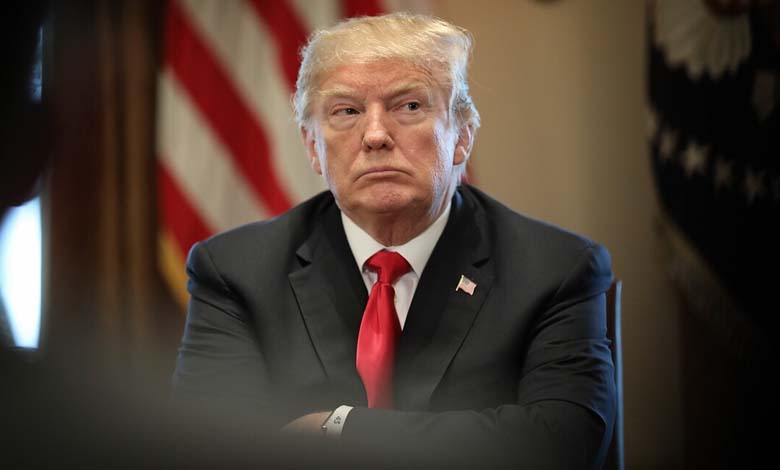“I’m Crazy”… Trump’s Foreign Policy Doctrine “Scares the World”

“He respects me and knows I’m crazy”… This is how former U.S. President Donald Trump described his relationship with Chinese President Xi Jinping. The American newspaper “Axios” believes this phrase sums up Trump’s approach to foreign policy.
-
“Enemy Within”: Trump’s Generals Turn Against Him
-
A Step towards Putin: Trump Blames Zelensky for Starting the Ukrainian War
Trump claims that he would bring peace to Ukraine, curb China’s “unfair” trade practices, compel allies to pay, and prevent attacks similar to the one on October 7 in Israel. Decision-makers worldwide fear what the former president and Republican candidate might do if they challenged him should he win the presidential election.

Trump also told the “Wall Street Journal” that he would threaten massive tariffs or completely cut off trade to prevent China from blockading Taiwan. When asked if he would use military force if Xi carried out his threats, Trump dismissed the idea entirely, saying, “I wouldn’t have to because he respects me and knows I’m crazy.”
-
“39 Minutes” of Dancing and Singing: Trump’s Practical Response to Criticisms about His Age
-
Trump receives intelligence report on “Iranian threats” to assassinate him
In the same interview, Trump claimed he told Russian President Vladimir Putin: “We’re friends. I don’t want to do this, but… if you target Ukraine, I’ll hit you hard,” including “right in the heart of Moscow.” Though there is no evidence such a conversation took place, Trump often recounts his interactions with world leaders in similar terms.

The Power of “Unpredictability”
Former National Security Advisor Robert O’Brien recently argued that the unpredictability of Trump’s actions could have prevented Russia’s military operation in Ukraine. O’Brien told the “New York Times” that while Putin knew President Joe Biden would impose sanctions rather than deploy forces, he might have faced a disturbing but improbable prospect of Trump sending in the Marines.
-
“I Failed You”: Details of the Letter and Reward from the Suspect in the Attempted Assassination of Trump
-
Ryan Wesley Routh: Who is the Perpetrator of the Second Attempted Assassination of Trump?
The “Madman Theory”
O’Brien, who is likely to hold a prominent role in a second Trump administration, compared this approach to Richard Nixon’s “Madman Theory”: if Putin believes there is a small chance of American intervention, he would be forced to reconsider his decisions.
According to Trump, simply threatening to use force – whether military or economic – would keep the world on track. During his debate with Vice President Kamala Harris, Trump boasted that Hungarian Prime Minister Viktor Orbán told him, “the world was less chaotic when he was president because other leaders were afraid of him.”
-
“AK-47”: The “Legendary” Soviet Weapon Present in the Attempted Assassination of Trump
-
Trump’s Proposed Plan to End the Ukraine War: Key Details, Including a “Demilitarized Zone”
Trump argued that his warnings about uncertain NATO defense pushed allies to increase military spending and that his “fire and fury” threats toward North Korea led Kim Jong-un to nuclear talks (though ultimately unfruitful).

Escalation for De-escalation
Scott Bissant, Trump’s economic advisor, told the “Financial Times” that the threat of a massive 20% tariff was an “extreme” stance aimed at bringing trade partners to the negotiating table, adding: “It’s escalation to de-escalate.”
-
Biden and the Trump Hat: A New Gaffe or a Noble Gesture?
-
Trump and Harris: The Real Showdown Begins on Tuesday
Trump himself hinted that his threats of massive tariffs on companies manufacturing abroad were “metaphorical.” He told “Fox News”: “I’ll say 100, 200, even 500, I don’t care.” According to Richard Haass, a veteran of four U.S. administrations and honorary president of the Council on Foreign Relations, “unpredictability can deter challenges.”

The Power of Unpredictability
Haass adds: “Unpredictability is more capable of deterring challenges than confronting them.” He argues this unpredictability may keep adversaries on alert for some time but rarely serves long-term U.S. interests, as it “also worries friends and allies.” In some targeted instances during his first term—such as when he threatened to destroy Turkey’s economy over the detention of an American pastor—Trump’s “I’m crazy” approach seemed to work. In others—like Trump’s insistence that Iran would come crawling for a new nuclear deal to escape his wrath—it did not.
-
Trump returns to court… and the reason is a song
-
The Judiciary Knocks on Trump’s Door Again: 2020 Election Disrupts 2024
Personal Relations
According to Axios, Trump’s vision for foreign policy in a potential second term relies entirely on his personal relationships with foreign leaders. Axios adds that “Xi respects and fears him, so he won’t invade Taiwan. Similarly, Putin and Ukrainian President Volodymyr Zelensky would respect him and quickly move toward peace if he won.”

While presidents often overestimate their ability to influence counterparts through personal chemistry or force of character, Haass argues that “Trump does it more than most.”
-
Trump and the 11 Men: The Billionaire in the “Foreign Policy” Cave
-
Trump or Harris? The Stock Market Predicts the Winner
-
Indian or Black?.. Trump Plays on Harris’s Origins and the White House Responds












